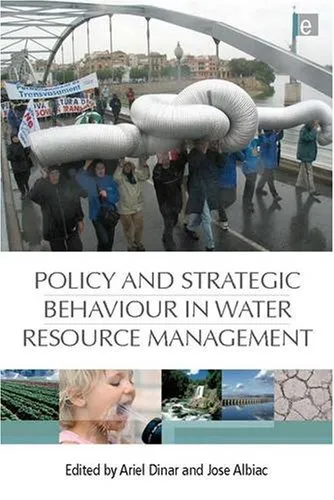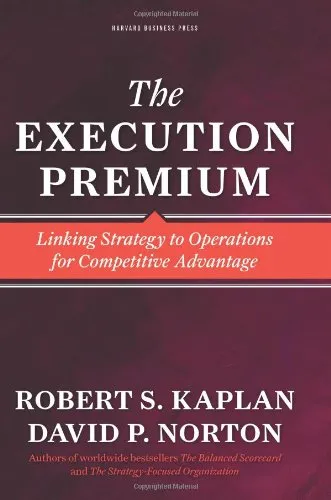Policy and strategic behaviour in water resource management
4.0
بر اساس نظر کاربران

شما میتونید سوالاتتون در باره کتاب رو از هوش مصنوعیش بعد از ورود بپرسید
هر دانلود یا پرسش از هوش مصنوعی 2 امتیاز لازم دارد، برای بدست آوردن امتیاز رایگان، به صفحه ی راهنمای امتیازات سر بزنید و یک سری کار ارزشمند انجام بدینکتاب های مرتبط:
معرفی کتاب "Policy and Strategic Behaviour in Water Resource Management"
کتاب "Policy and Strategic Behaviour in Water Resource Management" یکی از منابع برجسته در حوزه سیاستگذاری و مدیریت منابع آبی است که توسط آریل داینار و خوزه آلبیک تألیف شده است. این اثر به بررسی استراتژیها و رفتارهای تصمیمگیرندگان در مدیریت منابع آبی پرداخته و چالشهای متعددی را که این حوزه با آن مواجه است مورد تحلیل قرار میدهد. در دنیایی که بحرانهای آب به مسئلهای جهانی تبدیل شدهاند، این کتاب نه تنها یک راهنمای علمی بلکه یک ابزار ضروری برای سیاستگذاران، محققان و مدیران منابع آب به شمار میرود.
خلاصهای از کتاب
این کتاب در تلاش است تا مفاهیم میانرشتهای اقتصاد، سیاست و مدیریت را در چارچوب مدیریت منابع آبی ترکیب کند. نویسندگان با بهرهگیری از نظریههای اقتصادی و مدلهای تصمیمگیری، به تحلیل رفتارهای استراتژیک بازیگران در حوزههای مختلف منابع آب میپردازند. محورهای اصلی کتاب شامل معرفی ابزارهای اقتصادی در مدیریت منابع، تحلیل تضادها و همکاریهای بینالمللی، ارزیابی سیاستهای عمومی مرتبط با منابع آب، و شبیهسازی اثرات تغییرات اقلیمی و تاثیر آن بر اقتصاد آب است.
در این کتاب موضوعات کلیدی از جمله چگونگی تنظیم سیاستهای تقسیم منابع آب، مدیریت تضادها در آبراهههای مشترک و اصول اقتصاد سنجی در تخصیص منابع آب بررسی شدهاند. همچنین، جنبههای حقوقی و اجتماعی مدیریت منابع آب نیز در فصلهای مختلف کتاب به چشم میخورد.
نکات کلیدی
- اهمیت استفاده از ابزارهای اقتصادی در سیاستگذاری منابع آب.
- تحلیل رفتار استراتژیک بازیگران مختلف در مدیریت منابع آبی.
- ارزیابی اثرات تفاوت منافع در تعاملات بینالمللی بر مدیریت منابع مشترک.
- اثرگذاری تغییرات اقلیمی بر توسعه سیاستهای پایدار در حوزه آب.
- نقش علوم اجتماعی در تعاملات مرتبط با مصرف و مدیریت منابع آبی.
جملات معروف از کتاب
"Understanding the behavior of key stakeholders in water management requires integrating economic and social sciences."
"Policies for water resource management should not only be efficient but also equitable, ensuring sustainability for future generations."
چرا این کتاب مهم است؟
با افزایش جمعیت جهانی و فشار بر منابع طبیعی همچون آب، مدیریت منابع آبی به یکی از چالشهای بزرگ قرن بیست و یکم تبدیل شده است. این کتاب با ارائه یک دیدگاه جامع و علمی، به سیاستگذاران و متخصصان کمک میکند تا استراتژیهای موثری برای مدیریت منابع آب اتخاذ کنند. بهرهگیری از نظریات اقتصادی، اجتماعی و اقلیمی، این کتاب را به یکی از منابع بسیار ارزشمند برای تمام دستاندرکاران این حوزه تبدیل کرده است.
علاوه بر این، نویسندگان نه تنها جنبههای نظری، بلکه روشهای کاربردی حل مسئله را نیز مطرح کردهاند، که باعث میشود این اثر یک کتاب کاربردی برای تحلیل بحرانهای آبی و راهحلهای استراتژیک باشد.
Introduction to "Policy and Strategic Behaviour in Water Resource Management"
Water is one of the world's most vital and limited natural resources, and its management has never been more critical. "Policy and Strategic Behaviour in Water Resource Management" serves as a significant contribution to the complex domain of managing water resources in a rapidly changing world. Written by Ariel Dinar and Jose Albiac, this book meticulously explores the intertwined dynamics of policy-making, economic incentives, and strategic behaviour among stakeholders in the water sector. It bridges the gap between theoretical insights and practical implementations, unveiling how cooperation, competition, and institutional frameworks shape the allocation and governance of water resources.
Chronic water scarcity and growing demand for freshwater are pressing global challenges of the 21st century. Through this book, the authors shed light on these complexities and offer an interdisciplinary perspective anchored in economic theory, game theory, and policy research. The book is not only a resource for academics and policymakers but also for students, environmentalists, and anyone invested in understanding and addressing the intricacies of water resource management.
A Detailed Summary of the Book
The book comprehensively addresses the economic, institutional, and behavioural dimensions of water resource management. It delves into the role of public policies, regulations, and incentives in influencing the strategic behaviour of stakeholders—ranging from governments and large corporations to individual farmers and local communities. The authors use a blend of case studies, mathematical modeling, and theoretical frameworks to explore how economic tools such as pricing, trading, and subsidies impact water allocation systems.
Beyond economics, the book applies game theory to analyze interactions among stakeholders with competing interests. Water sharing agreements, cross-border issues, and the collective management of aquifers are all scrutinized through game-theoretic lenses. The work also highlights how climate change exacerbates existing challenges and introduces new dynamics to water management, emphasizing the need for adaptive and resilient policies.
A recurring focus of the book is the interplay between cooperation and competition. It examines how stakeholders negotiate, form coalitions, or attempt to outmaneuver each other for access to scarce resources. By integrating these concepts, the authors point out pathways to enhance efficiency, equity, and sustainability in water systems.
Key Takeaways
- Strategic behaviour significantly shapes outcomes in water resource allocation.
- Game theory provides powerful insights into the negotiation and cooperation processes among water stakeholders.
- Economic policies, such as pricing and water trading, can enhance allocation efficiency but must address equity considerations.
- Climate change intensifies the challenges of managing water resources, necessitating adaptive policies and long-term planning.
- Institutional frameworks play a central role in fostering cooperation and resolving conflicts in shared water systems across regions and countries.
Famous Quotes from the Book
"Water resource management is not only a technical or economic problem; it is fundamentally a human and institutional challenge."
"Cooperation is not always the result of harmony; often, it is the product of conflicting interests resolved by negotiation and trust-building."
"Policies that fail to consider the strategic behaviour of stakeholders are doomed to be ineffective at best or harmful at worst."
Why This Book Matters
The importance of "Policy and Strategic Behaviour in Water Resource Management" lies in its ability to address one of the most critical issues of our time. Water scarcity affects everyone, from marginalized communities to global economies, and finding equitable and sustainable solutions is paramount. This book stands out by combining theoretical rigor with practical insights to tackle real-world water management challenges.
Its interdisciplinary approach provides diverse audiences—including policymakers, researchers, and students—with a deeper understanding of the nexus between policy, human behaviour, and economic incentives. Recognizing that water conflicts often occur at the intersection of competing interests, the book provides actionable strategies for fostering cooperation and balancing competing demands.
Ultimately, this book is a call to action for sustainable water governance. By detailing the interconnections among stakeholders, institutions, and environmental pressures, it offers a compelling vision for managing water resources effectively in an increasingly uncertain world.
دانلود رایگان مستقیم
شما میتونید سوالاتتون در باره کتاب رو از هوش مصنوعیش بعد از ورود بپرسید
دسترسی به کتابها از طریق پلتفرمهای قانونی و کتابخانههای عمومی نه تنها از حقوق نویسندگان و ناشران حمایت میکند، بلکه به پایداری فرهنگ کتابخوانی نیز کمک میرساند. پیش از دانلود، لحظهای به بررسی این گزینهها فکر کنید.
این کتاب رو در پلتفرم های دیگه ببینید
WorldCat به شما کمک میکنه تا کتاب ها رو در کتابخانه های سراسر دنیا پیدا کنید
امتیازها، نظرات تخصصی و صحبت ها درباره کتاب را در Goodreads ببینید
کتابهای کمیاب یا دست دوم را در AbeBooks پیدا کنید و بخرید
1255
بازدید4.0
امتیاز0
نظر98%
رضایتنظرات:
4.0
بر اساس 0 نظر کاربران
Questions & Answers
Ask questions about this book or help others by answering
No questions yet. Be the first to ask!














